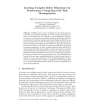233 search results - page 5 / 47 » Learning Complexity Dimensions for a Continuous-Time Control... |
117
Voted
EWLR
1997
Springer
15 years 6 months ago
1997
Springer
Building robots can be a tough job because the designer has to predict the interactions between the robot and the environment as well as to deal with them. One solution to cope the...
119
click to vote
TFS
2008
15 years 1 months ago
2008
Abstract--Since the fuzzy cerebellar model articulation controller (FCMAC) uses linguistic variables, it is highly intuitive and easily comprehended. Despite the FCMAC's good ...
107
click to vote
ATAL
2006
Springer
15 years 6 months ago
2006
Springer
We consider PAC learning of simple cooperative games, in which the coalitions are partitioned into "winning" and "losing" coalitions. We analyze the complexity...
100
Voted
ICML
2006
IEEE
16 years 3 months ago
2006
IEEE
We introduce the controlled predictive linearGaussian model (cPLG), a model that uses predictive state to model discrete-time dynamical systems with real-valued observations and v...
135
click to vote
ICML
2007
IEEE
16 years 3 months ago
2007
IEEE
Many robot control problems of practical importance, including operational space control, can be reformulated as immediate reward reinforcement learning problems. However, few of ...

